American business leaders and legal experts have publicly voiced their disapproval of the pro-Palestine protesters and have threatened them with their job finding process.

Student demonstrations met with strong American police crackdown while thousands of students detained. / Photo: AA
Influential American figures from various sectors have taken a firm stance against the protesters threatening them with their future as demonstrations in support of Palestinians have spread across the United States and beyond.
ExxonMobil CEO Darren Woods said the oil company would not be interested in hiring students taking part in pro-Palestinian protests at college campuses across the US.
"Harassment and intimidation, there's no place for that, frankly, at those universities and certainly no place for that in a company like ExxonMobil," Woods said in an interview with CNBC this week.
"We wouldn't look to bring folks like that into our company and if that action or those protests reflect the values of the campuses where they're doing it, we wouldn't be interested in recruiting students from those campuses," he added.
Student demonstrations began on April 17 at Columbia University to protest Israel's offensive in Gaza, where more than 34,600 Palestinians have been killed and 77,700 injured since an October 7 attack by Hamas.
The protests have served as a flashpoint for the wider movement to protest Israel’s war on Gaza.
Shark Tank host and businessman Kevin O'Leary had a much more blunt take on the consequences student demonstrators may face after graduating.
"These people are screwed," O'Leary said during a Fox News interview earlier this week, describing how artificial intelligence (AI) can identify each and every protester from video footage being taken at campus demonstrations.
"Everything being shot now is 1080p or 4K, even the surveillance cameras. Every single image, even at night now, goes into an AI generator and will tell you who that individual is," he explained.
"I have a lot of companies. I hire thousands of people. Within weeks, I'm gonna be able on, when we're doing your background check, I'm going to find this cause it's going to be in there on the dark web," O'Leary continued, gesturing to two hypothetical stacks of resumes. "Here's your resume with a picture of you burning a flag. See that one? That goes in this pile over here cause I can get the same person's talent in this pile that's not burning anything," he said.
"I don't care what university or what you're burning or whose side you're on. You'll never know why you didn't get a mortgage ... you'll never know I didn't get the job because we see you now, and all you need is to have your eyes exposed with a new 4K image, and for the rest of your life, you're in this pile."
"We will sue them and we will get their dorm rooms taken away. We will take their cars and their boomboxes and we'll bankrupt them," Dershowitz said in an interview with Newsmax.
"We will do whatever is necessary, under the law, in order to bring these lawsuits, bring them successfully and deter Oct. 7," he said, referring to a cross-border attack last year by Palestinian groups from Gaza into Israel.
Israel has pounded Gaza since a cross-border attack by Hamas, which Tel Aviv says killed nearly 1,200 people.
The Israeli war on Gaza has pushed 85 percent of the territory's population into internal displacement amid acute shortages of food, clean water, and medicine, while 60 percent of the enclave's infrastructure has been damaged or destroyed, according to the UN.
Israel stands accused of genocide at the International Court of Justice. An interim ruling in January ordered Tel Aviv to stop genocidal acts and take measures to guarantee that humanitarian assistance is provided to civilians in Gaza.
Hostilities have continued unabated, however, and aid deliveries remain woefully insufficient to address the humanitarian catastrophe.
By AVANI KALRA | akalra@chicagotribune.com | Chicago Tribune
PUBLISHED: May 5, 2024
A group organized by the Chicago Jewish Alliance gathered at Fullerton and Seminary avenues Sunday morning in response to an encampment set up Tuesday at DePaul University to protest the war in Gaza.
Members of Chabad Lincoln Park, Stand With Us, Hillel Metro Chicago and the Jewish Institute for Liberal Voices, among other groups, helped organize the demonstration and said they wanted to help Jewish DePaul students feel safer. The group flew Israeli and American flags.
Doreen Helmer traveled from Northbrook to attend Sunday’s counter-rally. She said it was important to her to travel to Lincoln Park to defend Israel in what she considers to be an increasingly hostile environment.
“It’s sad to see what’s happening in our city,” Helmer said. “They’re allowing these protests to ruin our campus and our neighborhoods. My friends can’t enjoy their neighborhood, they can’t walk their children to school anymore because of this. This is not free speech.”
Helmer said she was driving to the encampment Sunday afternoon flying an Israeli flag from her car when someone jumped on the car and tried to rip the flag off.
Henna Ayesh, an organizer and a media liaison with the DePaul encampment, said she was proud of the way encampment protesters have handled counterprotesters on campus. Leaders have been hosting a “de-escalation training” two to three times a day, she said, to teach them how to interact with counterprotesters.
Members of the encampment locked arms around the quad Sunday morning, facing the counterprotesters and surrounding their tents, while Chicago police formed two lines separating the groups.
Ayesh, who is a Palestinian student, said she is proud of the self-sustaining community she’s seen arise in the encampment. Organizers instructed encampment protesters not to engage with counterprotesters, and they have by and large respected that request, she said.
“I think one of the strongest principles of our community is that we keep each other safe,” Ayesh said. “We’re not relying on police, relying on public safety or on administration to keep us safe. We had counterprotesters throwing rocks and sticks, saying Islamophobic statements, but I’m really proud because we kept ourselves in control.”
Ayesh said there was one instance of confrontation in the encampment Sunday morning when a Palestinian student was hit in the face with a flag by a counterprotester. The student received medical attention, Ayesh said, and is doing well. According to the university, two people received treatment for minor injuries, and no arrests were made.

RELATED ARTICLES

University of Chicago prepares to ‘intervene’ to remove pro-Palestine encampment from campus
As pro-Palestinian protests at some U.S. colleges devolve into violence, Chicago campuses remain peaceful
By Sunday afternoon, a smaller group of counterprotesters stood across from DePaul’s quad on Fullerton Avenue. Another group gathered on the music lawn at Halsted Street and Fullerton Avenue, with snacks, posters and flags. Cars honked as they drove by, while children holding Israeli flags stood at the entrance to the lawn.
Police moved the encampment protesters inside the quad by Sunday afternoon. Some continued to gather by the entrances and cling to fences, facing the counterprotesters.
Participants also gathered around a large stage in the middle of the encampment, chanting “Disclose, divest, we will not stop, we will not rest” and “Free, free Palestine,” drumming and waving Palestinian flags.
Ayesh said encampment organizers negotiated with DePaul administrators before erecting the encampment and were told the university is invested in companies affiliated with Israel. Ayesh said the group decided to put up tents when administrators said they did not have the power to terminate those investments.Pro-Palestinian activists argue with pro-Israel activists while members of the Chicago Police department stand between the two groups outside a pro-Palestinian encampment at DePaul University in Chicago on May 5, 2024. (Armando L. Sanchez/Chicago Tribune)
Organizers last spoke with administrators Wednesday, according to Ayesh.
“I think a lot of our demands, like calling for a cease-fire, could’ve been fulfilled the exact same day,” Ayesh said. “But it’s day five, and we haven’t heard anything.”
In a Sunday evening statement, President Robert Manuel said he, Provost Salma Ghanem and Executive Vice President and CFO Sherri Sidler had requested to meet with students from the DePaul Divestment Coalition on Monday.
“We are deeply concerned that today’s events escalated beyond peaceful protest on the Lincoln Park Campus,” Manuel said. “It is our sincerest hope that our dialogue will result in solutions for the university that will allow us to move forward.”
DePaul University sent an alert advising students to avoid the quad and encouraged them to use alternate routes on campus Sunday, according to several students gathered at the camp.
On campus, the atmosphere remained serene. Students played soccer and read outside residence halls and school buildings.
Also on Sunday, encampment organizers from the School of the Art Insititute of Chicago announced that all 68 people arrested at a demonstration Saturday were released Sunday morning

The encampments are among dozens across Chicago and the nation at colleges, including the University of Chicago, Columbia University and the University of Illinois at Urbana-Champaign.
They started in the past few weeks amid the mounting death toll in Gaza. More than 34,000 Palestinians have been killed, according to the Hamas-run Health Ministry.
Israel launched its war in Gaza after Hamas’ Oct. 7 attack on southern Israel, where the group killed some 1,200 people and took 250 hostages. President Joe Biden on Thursday defended the right to protest but insisted that “order must prevail” at college campuses, as some in Chicago’s Jewish community demanded action at local universities to prevent hate speech.
Chicago Tribune’s Adriana Pérez contributed.








Pro-Palestinian activists argue with pro-Israel activists while members of the Chicago Police Department stand between the two groups outside a pro-Palestinian encampment at DePaul University on May 5, 2024, in Chicago. (Armando L. Sanchez/Chicago Tribune)
The wife of King Abdullah II of Jordan, Queen Rania al Abdullah, is a Palestinian and has been an outspoken opponent of the Israel-Hamas war.
Queen Rania al-Abdullah of Jordan recently defended the wave of anti-Israel demonstrations that have taken over US campuses, claiming that the students' true goals are justice and peace.

ByNikhita Mehta
May 05, 2024
“To vilify them as being, you know, pro-Hamas, pro-terrorism, or antisemitic—II think that’s inaccurate, And I think it’s somewhat patronizing,” Rania told CBS’ “Face the Nation” in an interview that aired on Sunday.
Callng the protestors “well-read and thoughtful young individuals”, she said that they know why are they protesting. “They are protesting for justice.”
However, Rania has advocated that it is unfair to paint all these students and these protests with a broad paintbrush.
She argued that a sizable portion of the student body participating in these protests is Jewish. Furthermore, the great majority of these protestors desire peace over destruction.
The wife of King Abdullah II of Jordan, Queen Rania al Abdullah, is Palestinian and has been an outspoken opponent of the Israel's war on Hamas that was launched in October 2023 after the terrorist organisation killed 1,200 people in an unexpected attack.
She did, however, concede that antisemitism is on the rise and called on Muslims everywhere to take leadership roles in the battle against it.
Rania speaks about the presence of antisemitism and how it has been on the rise. “And it is the worst kind of bigotry; it is pure hatred,” she said.
“Muslims have to be at the forefront of fighting antisemitism, because Islamophobia is the other side of the same disease, and it’s also on the rise.”
She stated that criticising the conflict "is not antisemitism," but rather "speaking against Israeli policy," and that many in the Muslim world are witnessing unsettling sights coming out of Gaza.
If Palestinians dislike Israelis, it's not because of their nationality or religion or; it's because they have only met with them as military enforcers, she explained.
Police arrest dozens of anti-Israel protesters at Chicago Art Institute
Protests escalate at Chicago's Art Institute, leading to arrests. Elsewhere, University of Michigan sees peaceful pro-Palestinian demonstration during commencement.
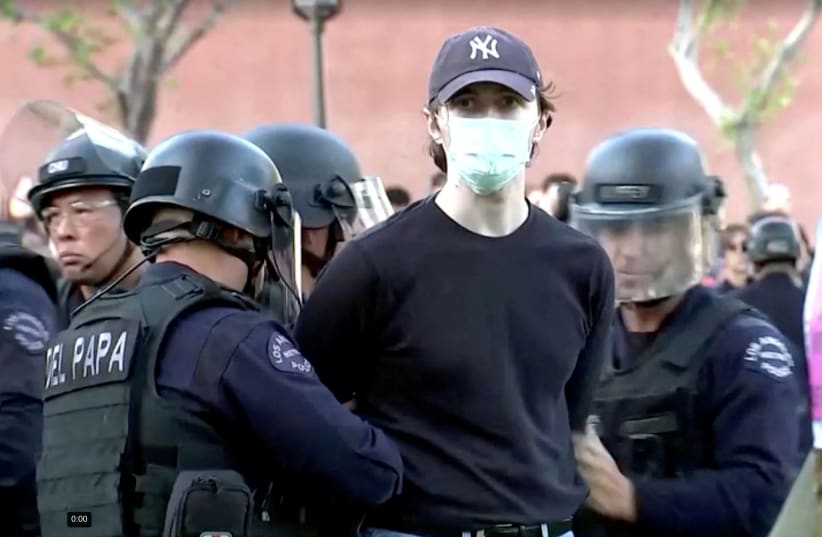
Dozens of protesters were arrested outside the Art Institute of Chicago during a demonstration on Saturday, following a police request from the institute to clear the premises, according to the Chicago Police Department’s post on X (formerly Twitter.)
Meanwhile, protests on other campuses did not escalate to arrests. In Ann Arbor, pro-Palestinian demonstrators temporarily interrupted a University of Michigan commencement ceremony. Videos on social media showed several students donning keffiyeh headscarves and graduation caps while waving Palestinian flags.
They marched down the Michigan Stadium’s central aisle, evoking cheers and boos from the crowd. Campus police escorted the protesters toward the stadium’s back but made no arrests, according to Colleen Mastony, a university spokesperson.
Former hostages demand answers from Gantz, Eisenkot regarding hostage deal
Campus peace protests
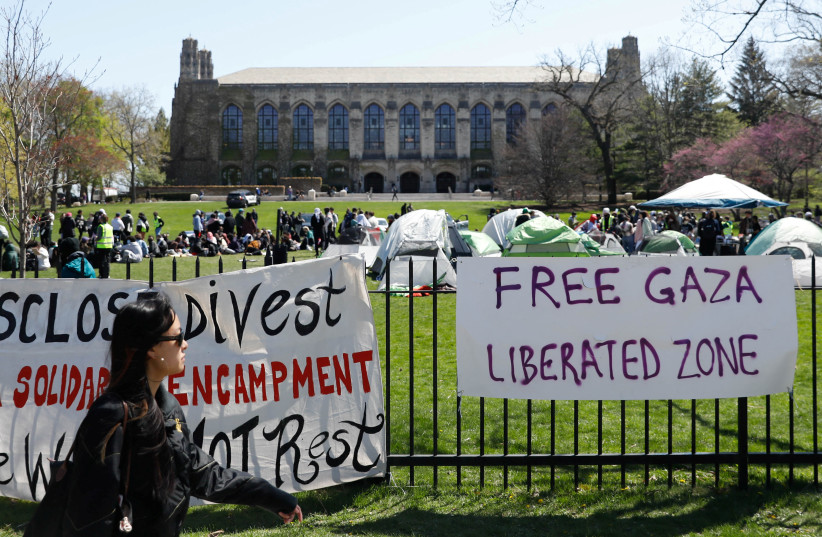
“Peaceful protests like this have taken place at U-M commencement ceremonies for decades,” Mastony said in a statement, reaffirming the university’s commitment to free speech and expression.
Controversial reactions to Israel’s conflict in Gaza have fueled heated protests across US campuses recently, with institutions like Columbia University seeking police assistance to manage the demonstrations. Police have so far detained over 2,000 protesters nationwide.
Demonstrators are protesting Israel’s response to the October 7 attack on southern Israel, in which Hamas operatives killed around 1,200 Israelis and foreign nationals and took more than 250 people hostage.
Ahmed Ali Akbar
Chicago Tribune (TNS)
After a tense day of protests, counterprotests and increased university police presence on the University of Chicago’s Main Quadrangle, the sun began to fade Friday evening and the Jewish holy day of Sabbath began.
Within the encampment established by the University of Chicago United for Palestine coalition, about 50 Jewish students and faculty and community members sat down on a blue tarp among tents and kaffiyehs to observe a planned prayer service. One challah was decorated with a Palestinian flag in seeds and herbs; the ceremonial “wine” (grape juice) was chosen because it was not made in Israel. Palestinian flags and handmade posters with slogans protesting genocide hung from trees. As they prayed, other students, many of whom were Muslim, held up kaffiyehs, jean shirts and checkered blankets to form a privacy screen.
Since April 29, Jewish anti-Zionist protesters at the Hyde Park campus have used food, ritual and community in the encampment as one of many ways to express their religious commitment to divestment from Israel, a multiethnic future and an end to killings in Gaza. In a practical sense, that means Seders and Shabbats (or Sabbaths), with non-Israeli kosher products, teaching about the pluralistic elements of Jewish traditions like the Moroccan Jewish Mimouna, and eating Palestinian food with Muslims and others in their coalition.
Avi Steinberg, a writer, faculty member and graduate of Orthodox yeshivas who spoke at the event, described Shabbat as a time of reflection.
“People sit with their thoughts and their emotions,” Steinberg said on a phone call Saturday. “It’s a time of stopping the clock completely.”
After the prayer and singing concluded, the Shabbat observers — a small but sizable portion of the broader encampment — dispersed; at the central food tent, a half-dozen or more unflipped maqluba pots sat beside rice and meat already doled out onto steam plates. Cold chopped salads and hot lentil soup were also served. This meal, donated by Arab restaurant Al Bahaar, acted informally as the Shabbat meal. The encampment food tent staff relies on donations of hot food and attempts to keep a variety of vegan, kosher, halal and nonallergenic options available for encampment dwellers.
The Muslim maghrib prayer began soon after on the same blue tarp. The University of Chicago United for Palestine coalition includes Students for Justice in Palestine, UChicago Jews for a Free Palestine, and several other organizations.
Nationally, encampments like this one have been accused of antisemitism. But in interviews with a half-dozen or more Jewish students and affiliated faculty members within the pro-Palestine encampment at the U. of C., none of them said they felt anything resembling antisemitism within the camp. Instead, they said they felt more connected to the Jewish tradition through their activism during the protests. They argued that anti-Zionism and advocating for Palestinian freedom is in a long tradition of Jewish values of pluralism and agitation for justice.
“When we’re praying for peace and human emancipation, to me this is the essence of what it means to be Jewish,” said graduate student Daniel Fernandez, speaking outside the encampment. “What is so profoundly disappointing is that this is somehow controversial.” Fernandez has stayed at the encampment, attending or sometimes leading several of the religious services this past week.
Chicago Jewish leaders held a news conference Wednesday where they called the encampments “platforms for antisemitism.” The university’s major Jewish organizations have disavowed, criticized or ignored the protesters.
In an email to the Tribune, Rabbi Yossi Brackman of Rohr Chabad at the University of Chicago wrote, “Movements have always had a token minority, this is no different. For example, there were some Black slave owners and Black people who fought for the Confederacy.”
Talking to the Tribune from within the encampment, graduate student Sofia Butnaru said many of the Israel-critical Jewish students did not feel they had a “religious home” at the U. of C. “We felt we weren’t represented in the other spaces, so we were really interested in building our own rituals and coming together as like-minded people to do the religious practices that are very near and dear to us,” Butnaru said.
Callie Maidhof, a professor of global studies and a member of Faculty for Justice in Palestine, agreed. “(Our Jewish institutions) have not made space for this,” she said. “That is especially true of the largest Jewish campus organizations like Hillel.”
While Hillel International’s Israel guidelines say the organization welcomes political pluralism and a diversity of student perspectives, its standards also state that it will not “partner with, house, or host organizations, groups, or speakers” that support practice certain positions, like the Boycott, Divest, Sanctions movement against the state of Israel. Members of organizations like FJP and Jewish Voices for Peace, which support BDS, would not be allowed to speak at Hillel under this policy.
A Hillel rabbi acknowledged but did not respond to a request for comment from the Tribune.
Despite feeling isolated from campus Jewish groups, UChicago Jews for a Free Palestine have organized several religious events since the encampment went up. According to messages with a Jewish organizer at DePaul’s encampment, a similar Shabbat service was held within the encampment on their campus. These events have attracted supportive community members like retired researcher Sandy Perpignani. She sat outside the U. of C. encampment and engaged with critical onlookers. At Shabbat time, she entered the encampment to pray with the students and organizers.
Regardless of some personal challenges, organizers constantly recentered the conversation toward what they see as the oppression and bravery of the Palestinian people. The protesters asked the university to divest from Israel and call for a cease-fire.
Within the Divinity School, Aviva Waldman, a writing instructor and alum who acts as a faculty liaison for organizing students, described a Passover event held by encampment organizers and allies that reflected their commitment to divestment from Israel, commitment to Palestinians and embrace of interreligious pluralism.
During Passover, which ended last week, Jewish communities avoided chametz (leavened goods like wheat and spelt) and instead consumed matzo. Encampment organizers are, for the most part, supportive of the demands of the Boycott, Divestment, Sanctions movement, but many matzo brands, including Manischewitz, make much of their product in Israel. Though Manischewitz is not officially part of the BDS boycott list, organizers felt they needed to make a modification. Unable to find non-Israeli-origin matzo in Chicago, Waldman said they ordered matzo from a specialty farm in New York. Earlier, Butnaru cooked matzo ball soup for Passover using a matzo meal that was not a product of Israel.
“Our home is wherever we are,” Waldman said. “There’s no nation-state that is our national homeland. We wanted our ritual items, the matzo, to come from our home.”
Palestinian olive oil from Jenin in the Israeli-occupied West Bank was also added to the Seder plate. The oil was available a bit closer to campus, from Canaan Palestine, a Madison, Wisconsin-based company that sources organic and fair trade olive oil from Palestinian orchards.
“The Seder plate is the most symbolic ritual item,” Waldman said. “(It) symbolizes Palestinian connection to the land and commitment to nurturing the land through farming olives and olive orchards.”
Organizers also revised their Haggadah, the text traditionally read at Passover Seder, to highlight parallels between the Palestinian freedom struggle and the story of the Jewish community fleeing from Egypt.
These changes reflect deep rifts and debates happening within Chicago Jewish communities.
“The Passover Seder is about one thing and one thing only,” Yossi wrote in an email. “The exodus of the Israelites from Egyptian slavery to return to the land of their Patriarchs, what would then become known as the Land of Israel. Anything else is a bastardization of Judaism. “
Another Chicago-area rabbi was supportive of the protesters.
“I’m in favor of Jewish people observing Shabbat, praying three times daily and fulfilling the commandments wherever they are,” Rabbi Aryeh Bernstein wrote in a message on X, formerly Twitter. Bernstein said the students and organizers’ actions are “not in conflict with (the Torah and Jewish law and teachings).”
On April 30, organizers held a Mimouna, a Sephardic tradition where Moroccan Jews celebrated the end of Passover by partaking in leavened goods and sweets with their Muslim neighbors. According to the organizers, observant Jews “sell” their leavened goods to Moroccan Muslims, only to buy it back when Passover is finished. While the festival is celebrated in Israel, Waldman says the important element of coexistence is not present.
Undergraduate student Andrew Basta helped organize the Mimouna; he has stayed most nights at the encampment tents since they were established.
“The traditional kind of food of the holiday would be mofletta, which is a kind of crepe-like pancake that is sweet,” Basta said on a phone call Saturday. “Sadly, we are not able to achieve making that within the encampment, based on (lack of) access to stoves.” Instead, they settled on pita and sweet dates.
“There were moments where we could be neighbors and be friendly and celebrate together,” Butnaru said. “Not to say that it was perfect coexistence, but there was coexistence.”
Basta is optimistic about the future and sees the Mimouna as symbolic of what is possible.
“We can rebuild joyous futures and multiethnic futures where Jews and Muslims can be neighbors without being part of an apartheid state or ethnic cleansing,” Basta said.
While Passover had ended by the time of Friday’s Shabbat, many organizers were still thinking about the lessons of that story: the struggle for liberation in the face of oppression.
“There’s nothing Jewish about an ethno-state,” Butnaru said. “There’s plenty of things that are Jewish about building community.”
Many students expressed the challenges of bringing their activism to their parents. Fernandez described his parents as “deeply committed to Zionism” and said that their conversations around the subject of the war in Gaza and his organizing have been “agonizing” for both parties.
“They think when I am in these camps, standing on this tarp praying … they think I’m praying for the destruction of the Jewish people.” But Fernandez said he is committed to nonviolence. He and other organizers believe that there can be coexistence and repair between Palestinians and Jews.
For the most part, the organizers in the encampment wish things were different with their families; but that won’t stop them from protesting.
“I want to begin from a premise that their hurt is real,” Fernandez said. “Our history as Jewish people is rooted in that; it’s real and palpable and omnipresent. I don’t want to dismiss their fear … but the same Torah has placed us on opposite ends of the issue.”
During the Shabbat, Avi Steinberg spoke and referenced a daily prayer from the Book of Numbers that translated to “How goodly are your tents, oh Jacob?”
This reference got a chuckle, but he explained the deeper meaning: You need to live every day as if you are in the tents.
In a later message, Steinberg explained “that talk was presenting tent life as a metaphor for radical politics specifically … the need for maintaining that radical edge even on a daily basis when we’re not literally in the tents.” He said he believed the encampment itself is a victory and that they would succeed in getting university leadership to divest financially from Israel and call for a ceasefire.
In the meantime, they were building their vision here, in the impermanence of the tents. In what they say is a multiethnic, pluralistic group committed to justice and peace.
©2024 Chicago Tribune. Visit at chicagotribune.com. Distributed by Tribune Content Agency, LLC.
The New Arab Staff & Agencies
05 May, 2024

No arrests were made while the Los Angeles police cleared a pro-Palestine encampment at University of Southern California [GETTY]
Los Angeles police made no arrests on Sunday while clearing a pro-Palestinian encampment at the University of Southern California, following arrests and turmoil at universities across the country over Israel's war on Gaza.
Other universities with graduation ceremonies on Sunday braced for more protests after dozens were arrested the previous day.
After USC requested assistance, police entered the encampment about 5 a.m. local time (1200 GMT) and worked with campus police to remove tents as students peacefully left the area, police said.
Campus protests have emerged as a new political flashpoint during a hotly contested and deeply divisive US election year. Police have arrested over 2,000 protesters at dozens of colleges around the country.
Mitch Landrieu, the national co-chair for President Joe Biden's reelection campaign, said on Sunday that Senator Bernie Sanders's comment comparing the college protests to those during the Vietnam War was an "over-exaggeration."
"This is a very different circumstance," Landrieu said on CNN. "However, that is not to say that this is not a very serious matter."
Many schools, including Columbia University in New York City, have called police to quell the protests.
Students and other protesters have called for universities to divest their financial ties to Israel and push for a ceasefire. In April, Los Angeles police arrested 93 people at USC after they cleared an earlier encampment.
Separately, there have been at least four bomb threats at New York area synagogues over the weekend, police said, but none have proven credible.
New York Governor Kathy Hochul said on X late Saturday: "We will not tolerate individuals sowing fear & antisemitism. Those responsible must be held accountable for their despicable actions."
More than 34,600 Palestinians have been killed in Israel's assault that has flattened the Palestinian territory, according to the Gaza Health Ministry.
(Reuters)
Opinion: Egyptian-American activist Aya Hijazi argues that the campus protests for Gaza are an awakening that could shift the West towards justice in Palestine
Aya Hijazi
05 May, 2024

Students watch as pro-Israel protestors demonstrate outside the gates and student demonstrators occupy the pro-Palestinian "Gaza Solidarity Encampment" on the West Lawn of Columbia University in New York, NY on Thursday, April 25, 2024 [Getty]
As Israel’s genocidal campaign in Gaza enters its seventh month this week, adding to seventy-five years of incremental ethnic cleansing of Palestinians, the only ray of hope lies in raising voices loud enough to pierce the silence and invisibility that Israeli, US, and European institutions have attempted to impose between Gaza and engaged citizens worldwide. The student protests sweeping across Western campuses may be the best chance to achieve that.
On April 18, a few courageous Columbia University students captured the world's attention with an encampment for Palestine, intending to address US complicity in Gaza.
They chose not to resign themselves to watching the genocide unfold on their phones while no one intervened, or at the very least, to give voice to the silenced cries of Palestinians in Gaza and the millions worldwide who cry out for them.
A few weeks earlier, a long-anticipated but diluted Security Council resolution calling for a ceasefire in Gaza was embarrassingly disregarded and quickly forgotten, as if it had never happened. The United States abstained and then falsely labeled it non-binding.
An ICJ ruling warning of an impending genocide was also dismissed. The United States and most European powers continued to provide weapons and military aid to Israel’s genocidal regime while many cut funding to UNRWA, the UN agency responsible for providing relief to Gaza, based on discredited Israeli allegations.
Global intifada for Palestine
The students who spoke out against this surreal duplicity quickly triggered the repressive instincts of the US establishment.
Instead of upholding the ethos of liberal education, where students learn how to "make the world a better place," one where genocides should not occur, Columbia University President Minouche Shafik - a British Egyptian woman - took a remarkably illiberal step and called on the notorious New York Police Department to suppress their students' voices.
Though I condemn her actions as a longtime activist interested in grassroots movements, I anticipated that her actions would backfire. If you want to inspire free spirits and fuel their movements, then apply force against them.
Sure enough, the brave and dedicated Columbia students were inspired to continue and expand their actions. In a rare moment of hope, pro-Palestine encampments spread rapidly across the United States and spilled over into Canada, Mexico, the United Kingdom, France, Germany, Spain, and even Australia.
A global intifada for Palestine was ignited.
RELATEDWorldBrooke Anderson
Last hope for a generation?
The world, but more importantly, the betrayed and forsaken free spirits in Gaza, felt the solidarity. University students in the United States are finally able to amplify their voices loud enough to break through the anti-Palestinian barriers of US institutions.
US universities and the government, from the executive to the legislative, have responded so far in ways reminiscent of the dictators they like to denounce, in two profound ways.
The first is through physical force, suppression, intimidation, and the arrest of student protesters.
The second is through defamation. The White House and mainstream media quickly denounced protests as anti-Semitic and uninformed. The US House of Representatives passed a bill redefining anti-Semitism as a radical anti-free speech measure intended to grant sweeping powers to the federal government to crack down on protests.
Yet, at this critical time, where the pendulum of history swings between progress and the liberation of natives from oblivion through settler colonialism, and their complete annihilation as a people with an identity, we must align ourselves with hope—the voices of university students echoing the cries of Palestinians in Gaza, unafraid to demand full liberation.
As the horrors of an imminent invasion of Rafah loom, so does the awakening of citizens in the Global North from indoctrination and therefore complicity in the horrors of Zionism. Yet, this prompts us to wonder: How long can US institutions ignore the awakening and continue to crack down on its leaders and fabricate lies about them as they have consistently done about Palestinians?
With all eyes on Gaza, how the United States responds to its students fighting for Gaza, and how history unfolds, will determine, at least for this generation, whether there is any hope in justice and humanity, or if it is all in vain.
US institutions, if not for the sake of justice but for their own survival, must embark on a path of self-correction. Otherwise, they will find themselves losing credibility with their population and future generations.
University students must persevere for this reason, and I have faith that they will. Their struggle is not symbolic, nor only for the sake of solidarity, but is one where their righteous fight can bend the arc of history towards justice, progress, and liberation.
With all eyes on Gaza, how the United States responds to its students fighting for Gaza, and how history unfolds, will determine, at least for this generation, whether there is any hope in justice and humanity, or if it is all in vain.
Aya Hijazi is an Egyptian American activist. She holds a Master’s degree in Public Administration from the Harvard Kennedy School as well as degrees in law and Conflict Analysis and Resolution. During the Arab Spring, she returned to Egypt where she established an NGO, Belady--An Island for Humanity. After the coup, police forces raided Belady and arrested Aya; she was imprisoned on fabricated charges for three years and was released after her case received international attention. She is now back in the US where she restarted Belady with a mission to defend human rights and freedom.
Follow her on X @ItsAyaHijazi
Ashitha Nagesh,Community affairs correspondent,@ashnagesh
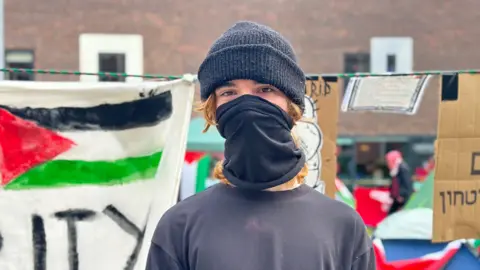
On a quiet morning outside Newcastle University, a small group of students listen to a lecturer talk about the opening song from Aladdin.
Specifically, this line: “It’s barbaric, but hey! It’s home.” She’s telling the group about Edward Said, and how his work looking at the way Middle Eastern cultures had been depicted in the West could be applied even to Disney films.
The talk then turns to how Said's theories could be applied to the portrayal of Palestinians in Western media.
While this scene doesn't sound out of the ordinary, this isn’t your usual university seminar. This lecturer was giving her talk in the middle of an encampment, which university students set up on Wednesday to protest against the war in Gaza.
Here in Newcastle, about 40 students have set up camp on the university’s quadrangle, with tents for sleeping, a makeshift first-aid centre, and tables for all the snacks donated by supporters - including crisps, water, and a Colin the Caterpillar cake.
Students themselves do coursework or exam revision on the grass, or slip off for seminars and lectures, as they would if it were student halls. Several staff members come in to show their support and drop off donations of snacks. All of those I speak to tell me they feel “proud” to see their students taking part.
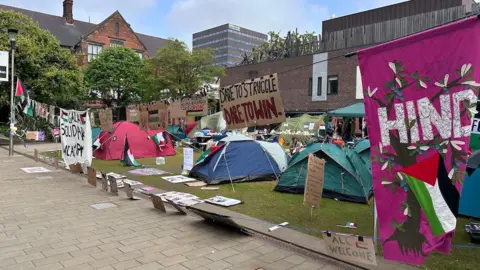
Running along the perimeter are hand-painted signs.
Naomi, who’s asked that we don’t use her full name, shows me a sign that she’d painted the night before.
“It says ‘Tzedek, Tzedek, Tirdof’,” she tells me. “It means ‘justice, justice, shall you seek’.”
Naomi says the sign - written in Hebrew - reflects how her Jewish faith has shaped her view of the conflict in Gaza.
“I was always raised with a very strong sense of justice, because of my Jewish community,” she explains, adding that the sign “encompasses so much of what my Judaism means to me”.
“In many ways, if I hadn’t been Jewish, I wouldn’t feel so firmly in solidarity with Palestine, because of the sense of social justice that my faith gives me.”
Newcastle students are just one of many student bodies across the country to set up similar occupied protests this week.
Similar outdoor camps have been erected on campuses including at Leeds, Manchester and Sheffield, while a camp outside Warwick University has been in place for 10 days. At Goldsmiths, University of London, students have occupied the library, inside the university building.
Earlier this week the Union of Jewish Students (UJS) released a statement saying campus protests in support of Gaza were creating a “hostile and toxic atmosphere for Jewish students”.
Guy Dabby-Joory, from the UJS, told me they knew there were Jewish supporters of the movement, but that they’d heard a lot of concerns from members.
These UK protests have sprung up amid the backdrop of much larger demonstrations and occupations on campuses across the US - most prominently at Columbia University, New York, and at the University of California, Los Angeles (UCLA).
Those protests have seen more than 2,000 people detained over the past fortnight.
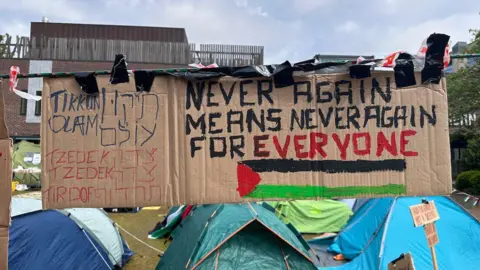
While the calmness of the Newcastle camp feels a million miles away from those scenes, those who are taking part tell me that their counterparts in the US have seen what they’re doing, and have been in touch.
“We’ve had some people from Columbia message us,” Frank, another student protester, tells me. Frank’s pronouns are they/them, and they asked that we not use their real name. “They just wanted to send us their solidarity - and that is really warming to see.”
They say the group behind the occupation - Newcastle Apartheid Off Campus - had been organising in support of Gaza for several months, and that the occupation was planned before the recent disorder kicked off in the US. But the occupation was partly organised now to say to US students: “You’re not alone.”
Students in the UK share some common goals with their US counterparts - in particular, the call for their universities to sever financial and research ties with Israel, a process known as divestment.
But as well as this, Frank tells me they feel an emotional connection to students in Gaza - who, in better times, are no different to them.
“There are tens of thousands of students in Gaza, and their lives are completely upended. There's no way you can pursue an education when you've got bombs raining down on you,” Frank said.
“We’re sat in a peaceful university, studying, and they don’t have that opportunity.”
More UK students occupy campuses, in Gaza protest
Police fired gun while clearing Columbia University protest
Although it’s quiet now, rallies that are held at 5pm daily attract hundreds of other students. Frank estimates there were around 200 people at the last one.
I ask one of the staff members - Dr Jemima Repo, a reader in political and feminist theory - whether she worries at all about the camp becoming disruptive during exam season.
“No, not at all,” she says. The camp itself, while on the campus and visible, is set apart from walkways and entrances.
“As far as I understand the relationship between campus security and police has been very good,” Dr Repo says, adding that there haven’t been any tensions among staff, either.
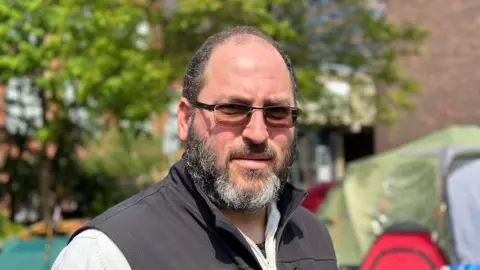
The university, meanwhile, says it “respects the right to peaceful protests and freedom of speech” and that they are “engaging with protesters”.
“Our priority is always to ensure that our campus remains safe for everyone and protests should be within the law - we do not tolerate the use of threatening, abusive or insulting words or behaviour that causes, or is likely to cause, distress,” it said in a statement this week.
Risk assessors also come by the camp while I’m there to make sure things are still peaceful, and that there aren’t any health and safety issues.
Lecturer Dr Mori Ram also comes to chat to students and show his support. He’s originally from Israel, and has family near the border with Lebanon.
The 7 October attacks by Hamas, and the Israeli bombardment of Gaza in the months since, have deeply affected him.
“To be honest, for the first time, I feel shame. My family is there… everything that happens there, they are exposed,” Dr Ram says.
“I do think that encampments like this, and what's happening right now in the US, may provide the necessary political pressure on the Israeli government to hopefully bring things to an end, in a good way.”
But Dr Mori says he knows he’s “not a representative of the majority of Israelis” with his views on the conflict.
Mr Dabby-Joory, from the UJS, said that "Jewish students, like all student communities, are broad and diverse, and there are a range of views in the Jewish student community".
“But I think many Jewish students are feeling unwelcome, uncomfortable and on edge," he said.
“That doesn’t mean that every student is feeling it, but we know from speaking to so many of our 9,000 students across the country that so many of them are feeling those things while on campus.”
The tensions within the community, and between others from her faith and those from her political groups, have affected Naomi too.
“It’s incredibly isolating,” she tells me.
“One of the slogans that’s often used [by Jewish pro-Palestinian activists] is ‘not in my name’. And I think, well, why should it be in anyone's name.
“It's also been an incredibly isolating experience to see the reaction to pro-Palestinian activism by other Jewish people, personally and in the wider world.
“It's been quite difficult at times to feel that sense of community, which has been such a big part of my upbringing.”
Pro-Palestine Student Protests Spread Despite Repression
MONDAY 29 APRIL 2024,
Thousands of students at dozens of campuses across the United States participated in April and continue today to join in pro-Palestine protests leading in some cases to brutal police repression, arrests, and suspensions or expulsions from the university.
The protests began at Columbia University, then spread to other elite private universities such as Yale and Harvard, and the University of Southern California, but soon included state universities such as the University of California campuses at Berkeley and Los Angeles and the University of Michigan, At Columbia, at Emory University in Atlanta, and at the University of Texas at Austin, police in riot gear broke up encampments on the campuses, beat and arrested students. On some campuses, police also arrested professors.
The student movement began as a demonstration of solidarity with the Palestinian people, calling for a “ceasefire now” and for an end to U.S. funding for Israel’s military. Quickly students also demanded that their universities divest from Israeli businesses, especially intelligence and arms makers, and some also called for an end to academic ties to Israeli institutions. Students pitched tents and set up camp in university plazas, engaging in peaceful protests. They didn’t engage in violence, did not damage property, and hardly interrupted university operations at all. Many of the protestors were both Palestinians and Jews, but also a diverse range of others.
College presidents, other university administrators, politicians, and some media characterized the demonstrations as anti-Semitic, claimed they were intimidating and threatening Jewish students, and alleged they were violent. Columbia University president Dr. Nemat Shafik was the first to call in the police, leading to beatings and arrests, outraging the students and many faculty members. Hundreds were arrested on various campuses around the country. While there doubtless some anti-Semitic remarks, they were rare exceptions and the demonstrations were fundamentally anti-Zionist and did not threaten Jewish students.
“Students are here because it has been over 200 days of watching a genocide unfold. Because people are tired of seeing their friends get beaten, arrested, suspended, and expelled for daring to use their voices to end their university’s complicity in the system,” says Cyn, a student at UC Berkeley. “Every year our universities send millions and millions of dollars to companies who manufacture weapons and surveillance equipment used to harass, intimidate, and brutalize Palestinians, and then our universities turn those same tactics on us. Our solidarity goes out to everyone fighting for a free Palestine.”
Mike Johnson, speaker of the House, in a shocking and unprecedented political move, went to Columbia University and spoke, calling the pro-Palestine protestors “a mob” that had threatened Jewish students and “supported terrorists.” He demanded that Columbia University president Shafik either bring the protests under control or resign. Republican Senators Tom Cotton of Arkansas and Josh Hawley of Missouri, called for troops to be sent in to crush the pro-Palestine campus protests.
Other protests calling for an immediate ceasefire and an end to U.S. funding for Israel continue to take place, such as the one I joined, a seder-protest held in front of the Brooklyn home of Senate Democratic majority leader Chuck Schumer, which blocked a major thoroughfare and led to 300 arrested.
Despite the repression, students appear to be determined to continue the protests and to force their universities to divest from Israel and to stop their government from aiding the Israeli military. But classes end in May. Where will the movement go? Some plan to go to the Democratic Party Convention in Chicago on August 19–22. Will it be another 1968?
28 April 2024
ATTACHED DOCUMENTS
Extraction PDF [->article8506]
Dan La Botz was a founding member of Teamsters for a Democratic Union (TDU). He is the author of Rank-and-File Rebellion: Teamsters for a Democratic Union (1991). He is also a co-editor of New Politics and editor of Mexican Labor News and Analysis.



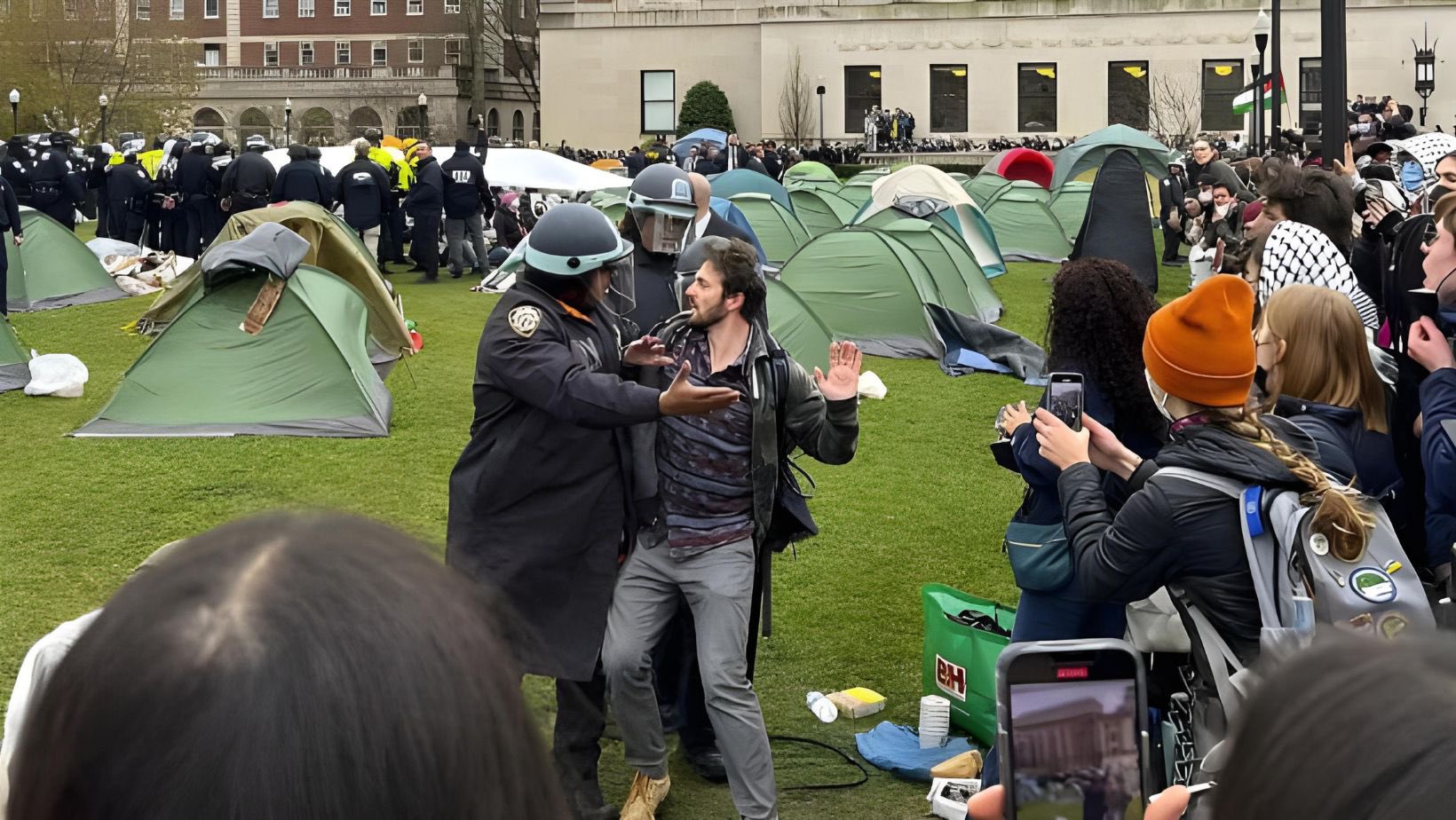


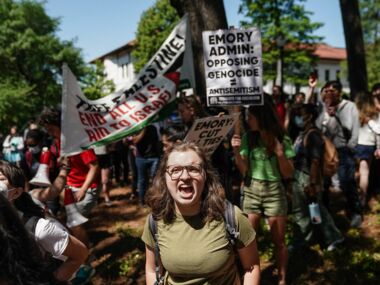
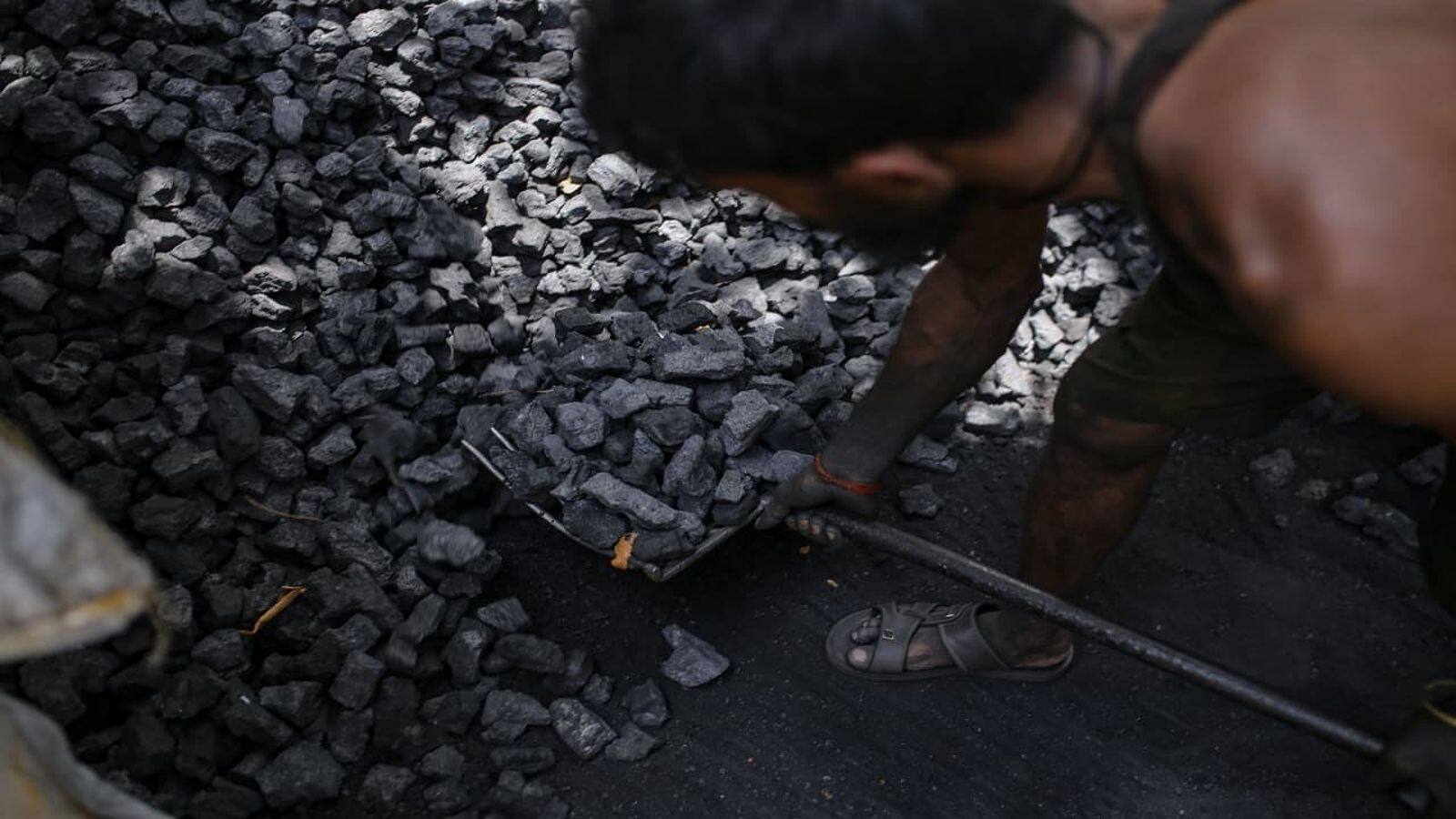







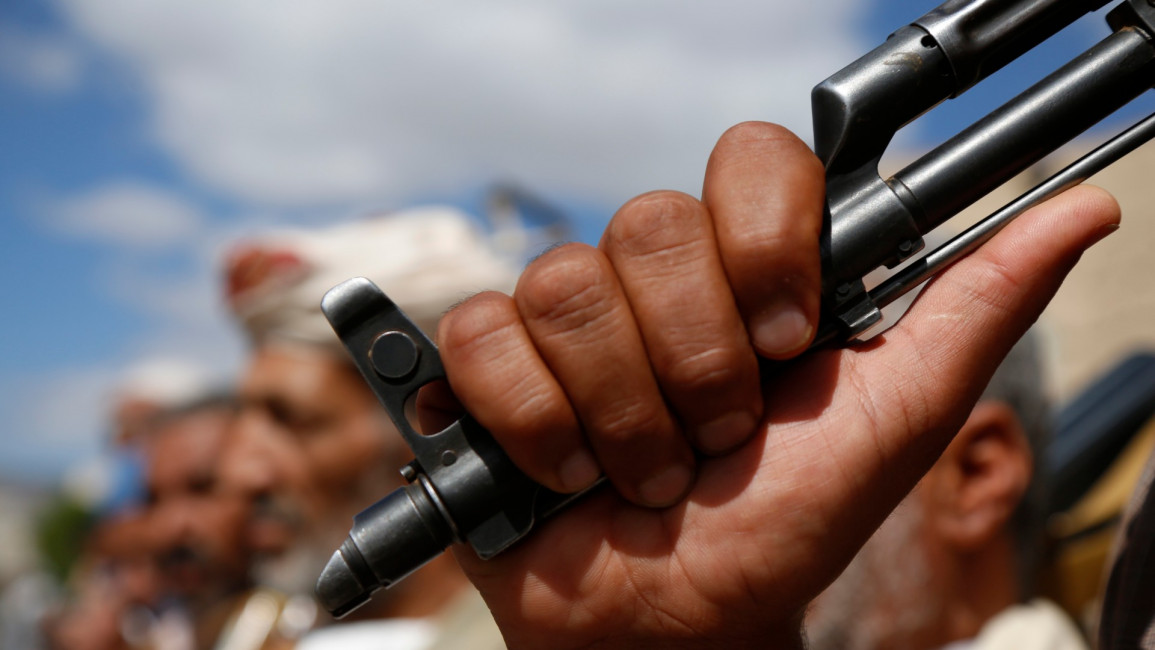
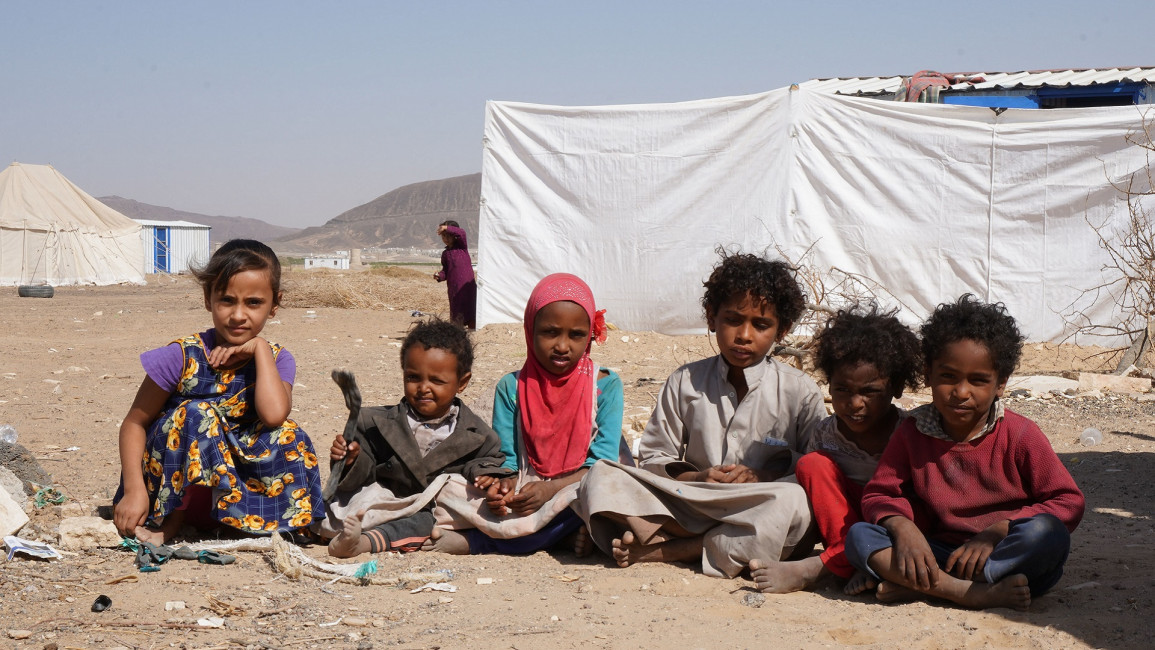 The impact of these rival economies has been most severe for Yemen's civilian population. [Getty]
The impact of these rival economies has been most severe for Yemen's civilian population. [Getty]